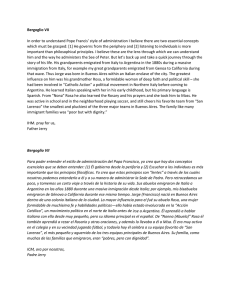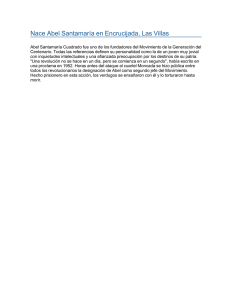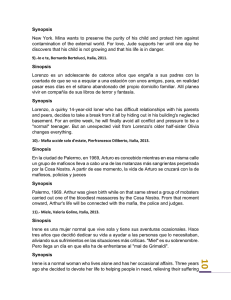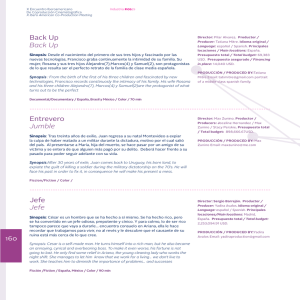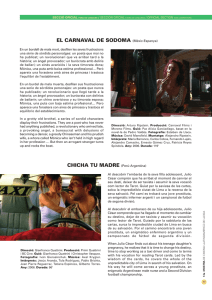CLXXV MUERTE DE ABEL MARTÍN I Los últimos
Anuncio
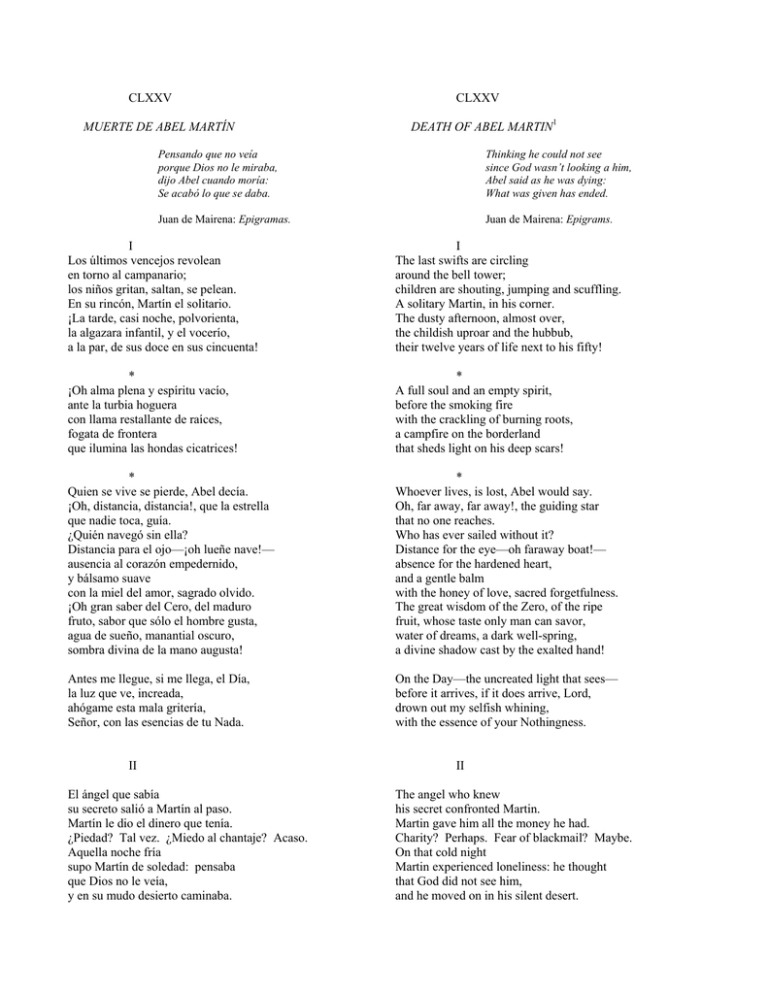
CLXXV MUERTE DE ABEL MARTÍN CLXXV DEATH OF ABEL MARTIN1 Pensando que no veía porque Dios no le miraba, dijo Abel cuando moría: Se acabó lo que se daba. Thinking he could not see since God wasn’t looking a him, Abel said as he was dying: What was given has ended. Juan de Mairena: Epigramas. Juan de Mairena: Epigrams. I Los últimos vencejos revolean en torno al campanario; los niños gritan, saltan, se pelean. En su rincón, Martín el solitario. ¡La tarde, casi noche, polvorienta, la algazara infantil, y el vocerío, a la par, de sus doce en sus cincuenta! I The last swifts are circling around the bell tower; children are shouting, jumping and scuffling. A solitary Martin, in his corner. The dusty afternoon, almost over, the childish uproar and the hubbub, their twelve years of life next to his fifty! * ¡Oh alma plena y espíritu vacío, ante la turbia hoguera con llama restallante de raíces, fogata de frontera que ilumina las hondas cicatrices! * A full soul and an empty spirit, before the smoking fire with the crackling of burning roots, a campfire on the borderland that sheds light on his deep scars! * Quien se vive se pierde, Abel decía. ¡Oh, distancia, distancia!, que la estrella que nadie toca, guía. ¿Quién navegó sin ella? Distancia para el ojo—¡oh lueñe nave!— ausencia al corazón empedernido, y bálsamo suave con la miel del amor, sagrado olvido. ¡Oh gran saber del Cero, del maduro fruto, sabor que sólo el hombre gusta, agua de sueño, manantial oscuro, sombra divina de la mano augusta! * Whoever lives, is lost, Abel would say. Oh, far away, far away!, the guiding star that no one reaches. Who has ever sailed without it? Distance for the eye—oh faraway boat!— absence for the hardened heart, and a gentle balm with the honey of love, sacred forgetfulness. The great wisdom of the Zero, of the ripe fruit, whose taste only man can savor, water of dreams, a dark well-spring, a divine shadow cast by the exalted hand! Antes me llegue, si me llega, el Día, la luz que ve, increada, ahógame esta mala gritería, Señor, con las esencias de tu Nada. On the Day—the uncreated light that sees— before it arrives, if it does arrive, Lord, drown out my selfish whining, with the essence of your Nothingness. II El ángel que sabía su secreto salió a Martín al paso. Martín le dio el dinero que tenía. ¿Piedad? Tal vez. ¿Miedo al chantaje? Acaso. Aquella noche fría supo Martín de soledad: pensaba que Dios no le veía, y en su mudo desierto caminaba. II The angel who knew his secret confronted Martin. Martin gave him all the money he had. Charity? Perhaps. Fear of blackmail? Maybe. On that cold night Martin experienced loneliness: he thought that God did not see him, and he moved on in his silent desert. III Y vio la musa esquiva, de pie junto a su lecho, la enlutada, la dama de sus calles, fugitiva, la imposible al amor y siempre amada. Díjole Abel: Señora, por ansia de tu cara descubierta, he pensado vivir hacia la aurora hasta sentir mi sangre casi yerta. Hoy sé que no eres tú quien yo creía; mas te quiero mirar y agradecerte lo mucho que me hiciste compañía con tu frío desdén. Quiso la muerte sonreír a Martín, y no sabía. IV Viví, dormí, soñé y hasta he creado —pensó Martín, ya turbia la pupila— un hombre que vigila el sueño, algo mejor que lo soñado. Mas si un igual destino aguarda al soñador y al vigilante, a quien trazó caminos, y a quien siguió caminos, jadeante, al fin, sólo es creación tu pura nada, tu sombra de gigante, el divino cegar de tu mirada. V Y sucedió a la angustia la fatiga, que siente su esperar desesperado, la sed que el agua clara no mitiga, la amargura del tiempo envenenado. ¡Esta lira de muerte! Abel palpaba su cuerpo enflaquecido. ¿El que todo lo ve no le miraba? ¡Y esta pereza, sangre del olvido! ¡Oh, sálveme, Señor! Su vida entera, su historia irremediable aparecía escrita en blanda cera. ¿Y ha de borrarte el sol del nuevo día? Abel tendió su mano hacia la luz bermeja de una caliente aurora de verano, ya en el balcón de su morada vieja. Ciego, pidió la luz que no veía. Luego llevó, sereno, el limpio vaso, hasta su boca fría, de pura sombra—¡oh, pura sombra!—lleno. III And he saw the elusive muse standing next to his bed, the mournful one, the evasive lady of his streets, who was beyond his love, yet always loved. Abel said to her: Lady, because I hoped to see your face uncovered I thought I would live until the dawn, until I felt that my blood scarcely flowed. Today I know you are not the one I expected; but I wished to see you and to thank you for all the time you kept me company with your cold disdain. Death tried to smile at Martin, and she didn’t know how. IV I lived, I slept, I dreamed and even created —Martin thought, as his eyes grew dim— a man who watched over sleep, something better than just dreaming. But if the same fate awaits the dreamer and the watcher, the one who traced out the roads, and the one who followed them, heedlessly, then the only creation is your pure nothingness, your gigantic shadow, the divine concealment of your gaze. V And after his anguish he felt the fatigue caused by his desperate anticipation, the thirst that water does not satisfy, the bitterness of an impure life. This lyre of death! Abel’s hand felt his weakened body. Wasn’t the one-who-sees-all watching him? And this apathy, the blood of oblivion! Please save me, Lord! His entire life, his unalterable history, appeared before him written in soft wax. And will you be eclipsed by the sun of a new day? Abel reached out his hand toward the vermillion light of a warm summer dawn, now on the threshold of his former abode. Blind, he asked for the light he could not see. Then he calmly lifted up to his cold mouth the clear glass, with pure shadow—yes, pure shadow!—overflowing. CLXXVI CLXXVI ANOTHER CLIMATE2 OTRO CLIMA ¡Oh cámaras del tiempo y galerías del alma tan desnudas!, dijo el poeta. De los claros días pasan las sombras mudas. Oh, chambers of time and corridors of the soul, how naked!, the poet said. The silent shadows of bright days are passing by. Se apaga el canto de las viejas horas cual rezo de alegrías enclaustradas; el tiempo lleva un desfilar de auroras con séquito de estrellas empañadas. ¿Un mundo muere? ¿Nace un mundo? ¿En la marina panza del globo hace nueva nave su estela diamantina? ¿Quillas al sol la vieja flota yace? ¿Es el mundo nacido en el pecado, el mundo del trabajo y la fatiga? ¿Un mundo nuevo para ser salvado otra vez? ¡Otra vez! Que Dios lo diga. Calló el poeta, el hombre solitario, porque un aire de cielo aterecido le amortecía el fino estradivario. Sangrábale el oído. Desde la cumbre vio el desierto llano con sombras de gigantes con escudos, y en el verde fragor del oceano torsos de esclavos jadear desnudos. Y un nihil de fuego escrito tras de la selva huraña, en áspero granito, y el rayo de un camino en la montaña… The music of the old hours dies out like a prayer of cloistered joys. Time brings a parade of dawns, with a trail of extinguished stars. Is a world dying? Is a world being born? In the watery belly of the planet is another ship leaving its diamantine wake? Has the old fleet turned belly up? Is it the world that was born in sin, the world of toil and weariness? A new world that must be saved again? Again! May God tell us. The poet, a lonely man, was silent because a cold wind out of the sky muted his delicate Stradivarius. His ears were bleeding. From the heights he saw the deserted plain with shadows of giants bearing shields, and in the green clamor of the ocean the naked torsos of panting slaves. And a nihil of fiery letters written on the sheer granite beyond the hostile forest, and the ribbon of a road on the mountainside… 1 For an interpretation of “The Death of Abel Martin” see Chapter III of my book The Religious and Philosophical Thought of Antonio Machado, also posted on this web site. 2 For an interpretation of “Another Climate” see Chapter IV of my book The Religious and Philosophical Thought of Antonio Machado, also posted on this web site. http://www.armandfbaker.com/book.html
